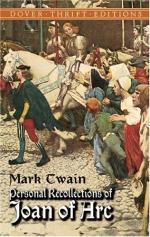“By my faith, sir! I make bold to say and swear, on pain of death, that he is the most noble Christian of all Christians, and the best lover of the faith and the Church!”
There was an explosion of applause from the crowd—which angered the preacher, for he had been aching long to hear an expression like this, and now that it was come at last it had fallen to the wrong person: he had done all the work; the other had carried off all the spoil. He stamped his foot and shouted to the sheriff:
“Make her shut up!”
That made the crowd laugh.
A mob has small respect for a grown man who has to call on a sheriff to protect him from a sick girl.
Joan had damaged the preacher’s cause more with one sentence than he had helped it with a hundred; so he was much put out, and had trouble to get a good start again. But he needn’t have bothered; thee was no occasion. It was mainly an English-feeling mob. It had but obeyed a law of our nature—an irresistible law—to enjoy and applaud a spirited and promptly delivered retort, no matter who makes it. The mob was with the preacher; it had been beguiled for a moment, but only that; it would soon return. It was there to see this girl burnt; so that it got that satisfaction—without too much delay—it would be content.
Presently the preacher formally summoned Joan to submit to the Church. He made the demand with confidence, for he had gotten the idea from Loyseleur and Beaupere that she was worn to the bone, exhausted, and would not be able to put forth any more resistance; and, indeed, to look at her it seemed that they must be right. Nevertheless, she made one more effort to hold her ground, and said, wearily:
“As to that matter, I have answered my judges before. I have told them to report all that I have said and done to our Holy Father the Pope—to whom, and to God first, I appeal.”
Again, out of her native wisdom, she had brought those words of tremendous import, but was ignorant of their value. But they could have availed her nothing in any case, now, with the stake there and these thousands of enemies about her. Yet they made every churchman there blench, and the preacher changed the subject with all haste. Well might those criminals blench, for Joan’s appeal of her case to the Pope stripped Cauchon at once of jurisdiction over it, and annulled all that he and his judges had already done in the matter and all that they should do in it henceforth.
Joan went on presently to reiterate, after some further talk, that she had acted by command of God in her deeds and utterances; then, when an attempt was made to implicate the King, and friends of hers and his, she stopped that. She said:
“I charge my deeds and words upon no one, neither upon my King nor any other. If there is any fault in them, I am responsible and no other.”
She was asked if she would not recant those of her words and deeds which had been pronounced evil by her judges. Here answer made confusion and damage again:




